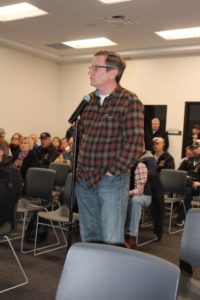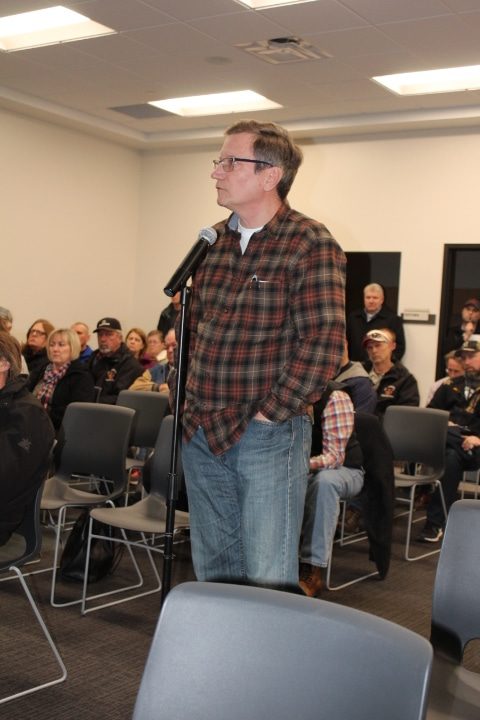by Dave DeMars
news@thenewsleaders.com
Taxes? Regulation? Land rights and zoning? Lifestyle changes? Benefits? Government overreach? These were just a few of the concerns and questions 60-80 St. Joseph Township citizens had for the members of the St. Joseph City Council during the Feb. 15 open meeting dealing with the Orderly Annexation Agreement. But layered underneath the questions and statements was another message and it came through loud and clear. We don’t trust government.
This was the second open meeting with questions raised in civil tones compared with the first session marked by a more heated atmosphere.
Reasons for annexation
After welcoming the attendees and explaining while a few questions from the last open meeting would be answered, there was still much discussion going on and this meeting was primarily to hear more concerns and gather information, Acting Mayor Dale Wick turned the meeting over to City Administrator Judy Weyrens.
Weyrens reviewed the concerns expressed at the first meeting which included the following: Why annex at all? What benefits do residents gain from annexation? What about taxes? and What kind of governance and ordinance regulations will there be?
Weyrens also explained the need for annexation. The 1997 OAA foresaw the need to have a plan so the city and the township could effectively and efficiently plan for infrastructure extension. The annexation area was divided into three districts each with a different time frame for annexation. The deadline for the final annexation was Dec. 31, 2017.
Weyrens also pointed out the city boundaries are fragmented with island areas separating parts of the city. Stearns County, which used to administer the zoning, will no longer provide that service. The township has agreed to the city of St. Joseph taking over that function. This should make the entire process of zoning and building permitting more streamlined.
Weyrens said the intent of annexation was to allow residents in the newly annexed areas to continue to utilize their property in the same fashion as before the annexation. The city is seeking to create the Urban Expansion District so the same zoning districts will exist in both city and township. Doing that will allow for an orderly development of property while allowing the city to extend utilities in a cost-effective manner.
There would be few changes in ordinances, Weyrens said. The township already has restrictions such as on open alcohol containers and public urination. There might be some minor changes in siting buildings, but by and large the ordinance changes would be kept to a minimum.
Negotiations with the township as to the exact areas that are proposed for annexation are still ongoing. A smaller area might be annexed rather than the broad area originally proposed.
Citizen participation
After hearing Weyrens’ presentation, about a dozen or so citizens spoke to the council about concerns.
Kevin Kluesner questioned whether the city had to have all of the details and changes worked out and solutions in place before the annexation could actually be completed, or was the annexation an ongoing event that would be in a state of flux with decisions being handed down piecemeal by the council?
The answer was the details did not have to be completely in place, but at present, there’s time to discuss and plan for the eventual annexation and changes that might be necessitated.
Kluesner followed up with a question on taxation and learned a $100,000 piece of property would be taxed at about a third less in the township than in the city.
Peter Drew followed Kluesner with additional concerns about the tax rate. He said he had done some checking with the county auditor and the tax increase looked substantial.
“It looks like our area under the township tax rate – we would pay about $400,000, and under the city rate we would pay just a little over $1 million,” Drew said. “It would be about three times what we’re going to end up paying – about a $600,000 increase.”
There are lots of people in the city and fewer in the township. Drew’s concern was that city administrators would tax heavily because there was less representation from the annexed portions of the township.
“We won’t be able to have much input into that kind of stuff when it comes right down to it,” Drew said. “I have a number of concerns about the ongoing inequities.”
Drew was also concerned those left in the township would be hit with a large tax bill because of the fewer number of taxpayers after annexation. Drew’s concerns about taxes would be echoed by others who addressed the council.
Steve Buermann also voiced opposition to the annexation saying the city was acting with little if any input from the property owners. The services which were alluded to earlier in the meeting would be years in coming. The area is too large for the city to provide the needed services. Buermann favors a plan of small annexations.
“Annexation for the purpose of annexation is not acceptable, nor is annexation to increase tax revenue,” said Buermann, who received enthusiastic applause when he finished. “I would like to recommend the city rethink their overly ambitious takeover of these properties. It appears to be a land grab, tax grab and government overreach.”
Dan Rassier uttered similar complaints suggesting lack of input in the decision-making process. Residents in the township don’t necessarily want or need to be annexed, he said.
“Who would choose to live in a state of stress and anger with other townsfolk?” he asked. “If something is legal or may be legal, does it make it right?”
Rassier also suggested landowners were not given due process and had rights usurped because of this. He referenced actions in Waite Park.
Jennifer Hiltner also spoke for herself and several neighbors. Her concerns centered around tax rates in her developed neighborhood that is zoned R-1 and R-2. Would they be taxed at the city rate of 61 percent or at the township rural rate of 21 percent, she wondered.
Eric Ostendorf raised a question of whether the annexation was being done in the best way. Shouldn’t landowners and developers be the ones to petition the city for annexation rather than the city simply annexing, he asked. Ostendorf and others referred to the annexation as the city “taking the land.”
“The thing that is becoming kind of apparent – and I don’t think anyone wants to admit it – is you want the control, and you want the tax base,” said Ostendorf. “That is what is driving all of this.”
Other speakers seemed to echo many of the same themes during the meeting. In the end, the council did not respond to any questions or concerns except to say more meetings are being planned and negotiations are ongoing. Nothing has been firmly approved, but at this time, the council is simply exploring options as how best to approach this issue.

Kevin Kluesner expresses his concerns about the annexation process and what it might cost in new taxes. His concerns were echoed by many in the crowd.

About 75 citizens wait for the start of the OAA meeting dealing with the annexation of a part of St. Joseph Township Feb 15. The crowd filled the meeting room of the city office building and some stood outside the doors.

Members of the city council listen and watch a slide presentation by City Administrator Judy Weyrens as she explains the process of annexation, how it came into existence and its purpose.




